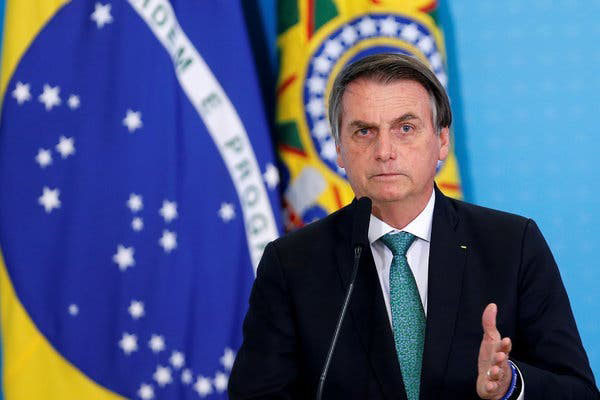BRASILIA, (Reuters) – Brazil’s Supreme Electoral Court (TSE) decided yesterday to open an investigation into far-right President Jair Bolsonaro for his statements claiming there will be fraud in next year’s elections.
Bolsonaro, who is expected to seek a second term in 2022, has repeatedly said Brazil’s electronic voting system is vulnerable to fraud.
Critics say Bolsonaro, like former U.S. President Donald Trump, is sowing doubts with his unfounded claims in order to pave the way for him not to accept defeat in 2022.
The TSE also decided to ask the Supreme Court to investigate whether Bolsonaro committed a crime by attacking the electoral system on social media and threatening Brazil’s democracy.
The TSE voted to investigate Bolsonaro after he accused the court’s members of complicity in maintaining a voting system that would help former leftist President Luiz Inacio Lula da Silva return to power.
Bolsonaro is calling for the adoption of printed receipts that can be counted if any election result is disputed, a paper trail that would change the current all-electronic voting system. Bolsonaro has said he might not accept the result of next year’s presidential election if the system is not changed.
Over the weekend, supporters of the president held demonstrations in several cities backing his proposal.
Earlier on Monday, a group of 18 active and former Brazilian Supreme Court justices, who also serve as judges on the TSE, said the election system is free of fraud.
“Brazil has eliminated a history of election fraud,” the judges said in a statement, saying that since the electronic voting system was adopted in 1996, there has never been a documented fraud case in any election.
“The electronic voting system is subject to audits before, during and after the election,” they said. The judges said all the steps are monitored by political parties, prosecutors, federal police, universities and the Brazilian Bar Association.
The judges said printed ballots are less safe than electronic voting, and that if Brazil goes back to manual counting of 150 million printed ballots, the chance of fraud would be higher.
A congressional committee will vote Thursday on a proposal pushed by Bolsonaro to introduce paper ballots.
The government solicitor general’s office did not immediately reply to a request for comment on the TSE decision.
EU puts sanctions on 8 more Nicaraguans, as presidential race takes shape
BRUSSELS, (Reuters) – The European Union said yesterday it has imposed sanctions on eight Nicaraguans for human rights violations or undermining democracy or the rule of law, including Rosario Murillo, the vice president and wife of President Daniel Ortega.
The step adds to growing international isolation of Ortega’s government, which has been criticized for crackdowns against his opponents and critical media in the Central American country he has dominated since returning to power 15 years ago.
Ortega’s government has arrested several political adversaries, including presidential hopefuls, ahead of a November election in which Ortega, a former Marxist guerrilla and Cold War antagonist of Washington, will run for a fourth consecutive term.
Contenders from five parties on Monday registered with election authorities to enter the race, Nicaraguan media reported. By evening, no candidates had been put forward by the top opposition groups, whose leaders largely remain in detention.
The EU move follows sanctions by the United States on senior officials in Nicaragua and other members of Ortega’s family.
The Council of the EU said the sanctions, which include an asset freeze and a travel ban that impedes the eight from entering or transiting through EU territories, brought to 14 the number of Nicaraguans restricted by the bloc.
“The political situation in Nicaragua has further deteriorated in recent months,” the Council said in a statement.
“The political use of the judicial system, the exclusion of candidates from the elections and the arbitrary delisting of opposition parties are contrary to basic democratic principles and constitute a serious violation of the rights of the Nicaraguan people.”
The Council of the EU said the detention in July of a seventh potential presidential candidate “illustrates the magnitude of the repression in Nicaragua and projects a grim picture for the upcoming elections.”
Amnesty International on Monday called for rights violations in Nicaragua to be investigated, warning that Ortega had built a system of impunity likely to hamper fair elections.
“The road to the elections will be plagued by repressive actions implemented to make it impossible for the population to exercise their political rights without fear of reprisals,” Amnesty International said in a statement.




